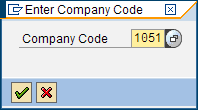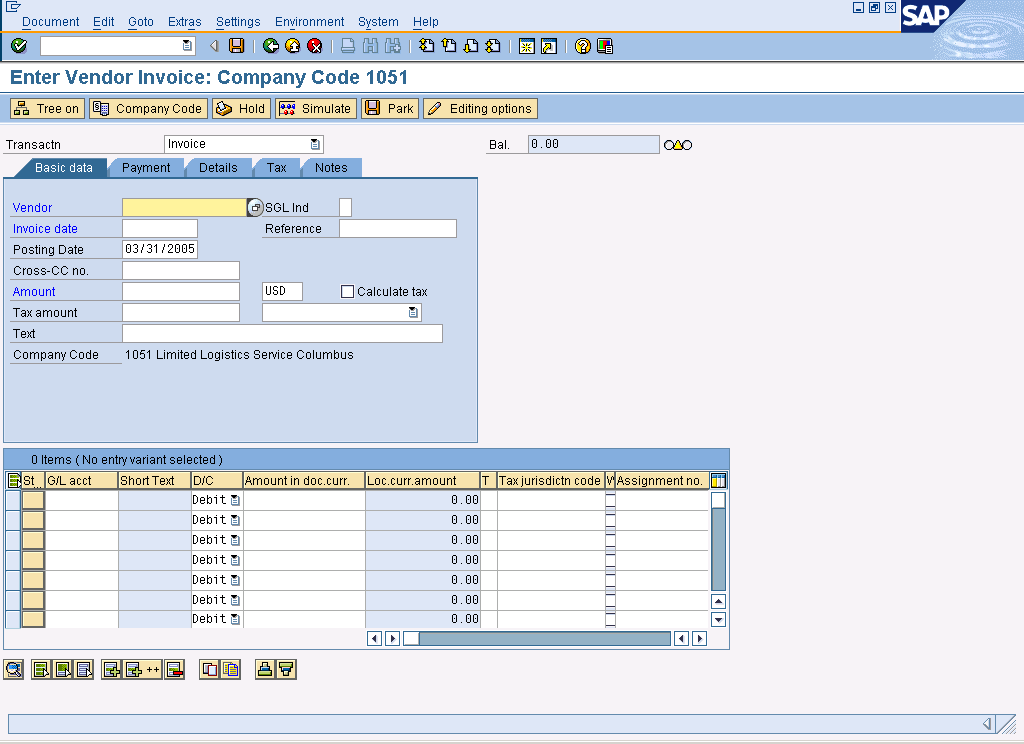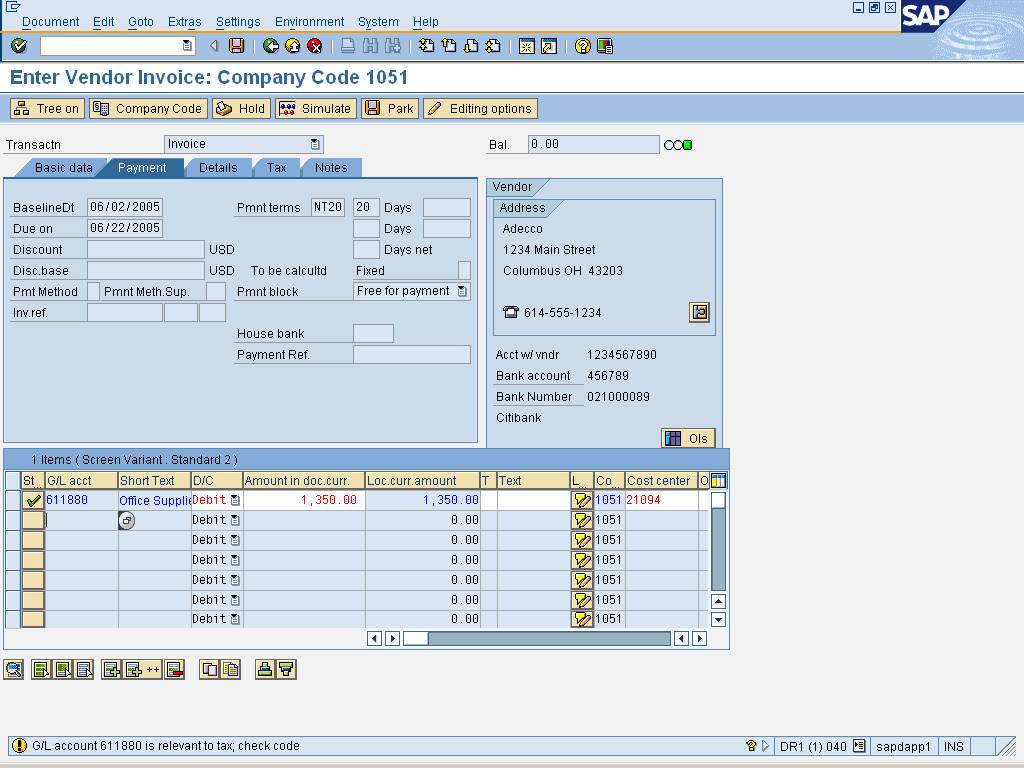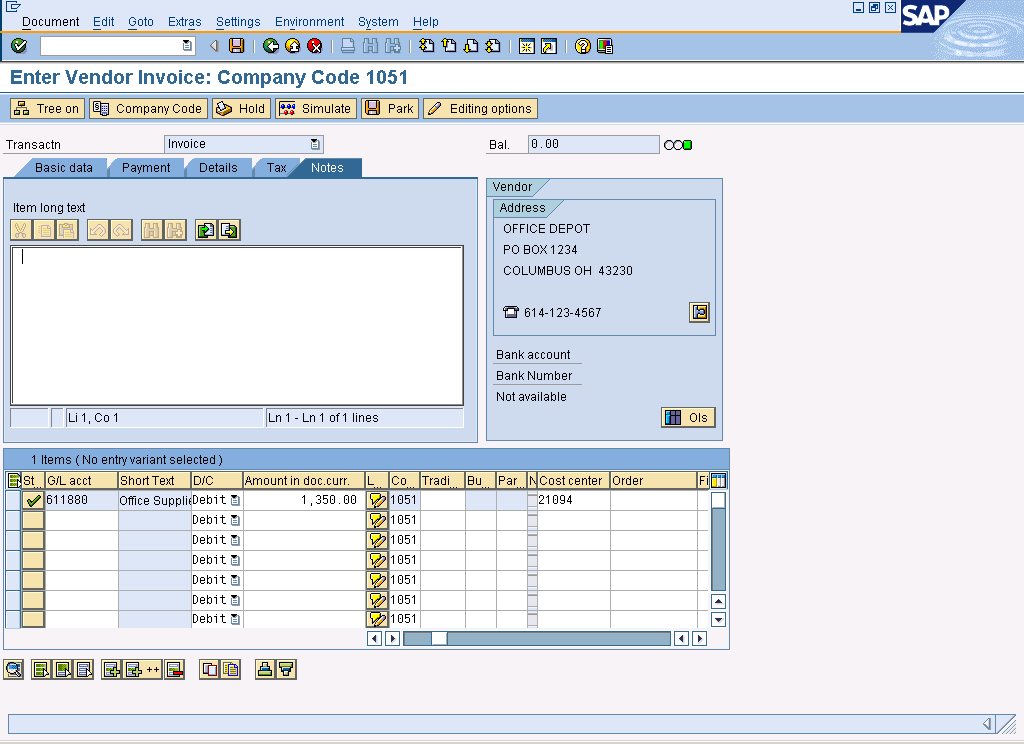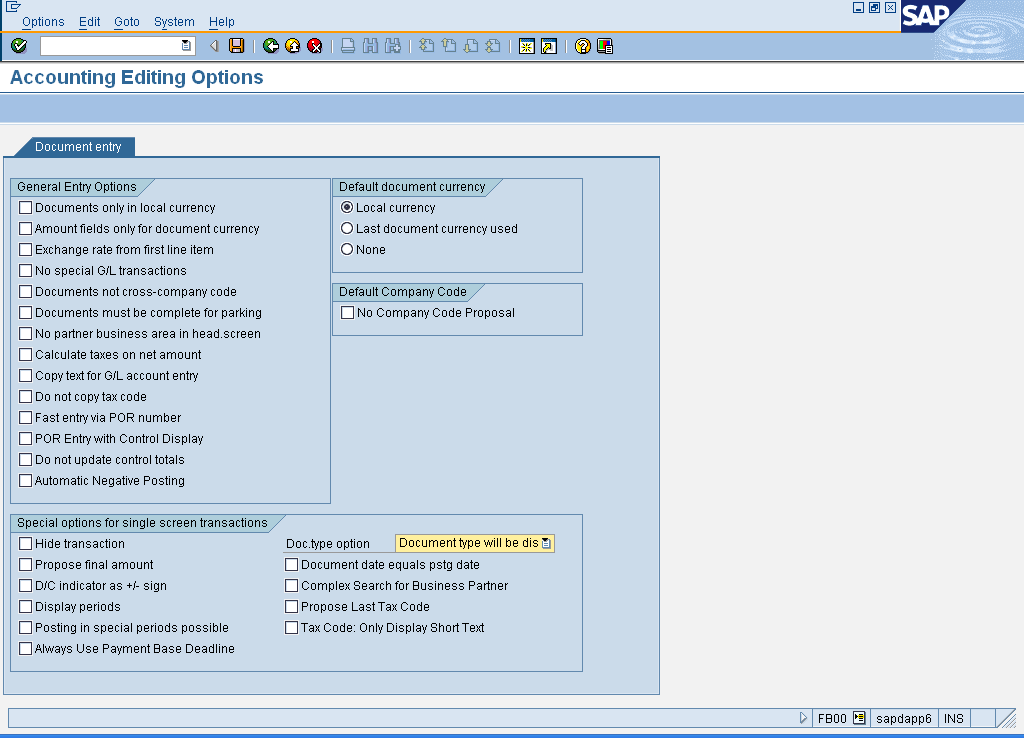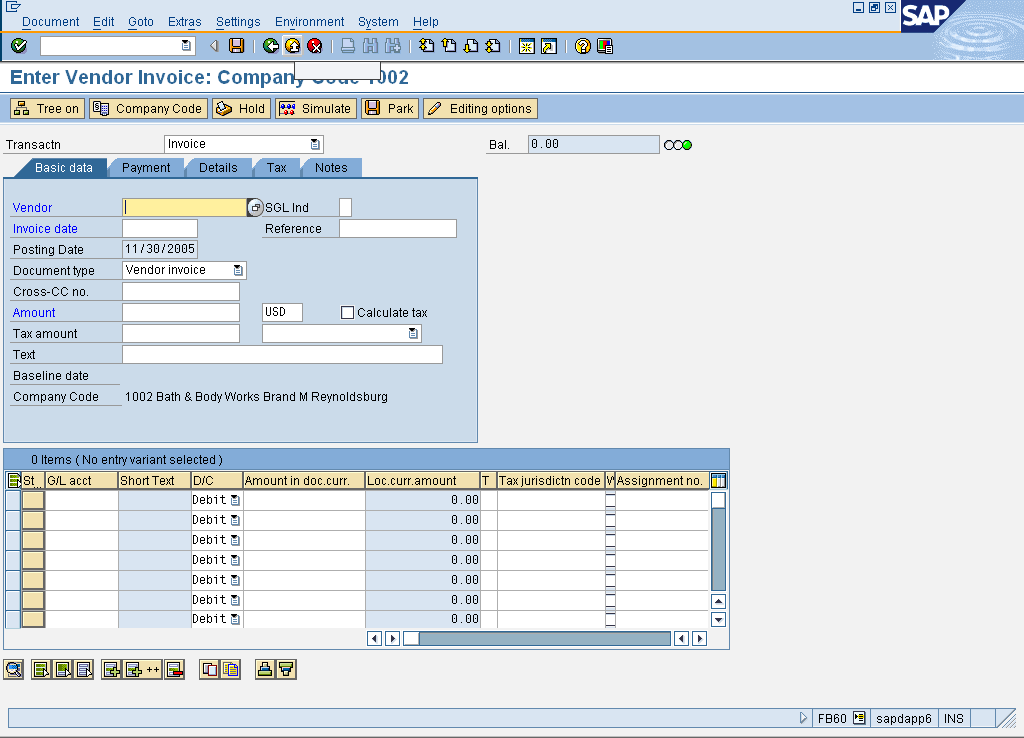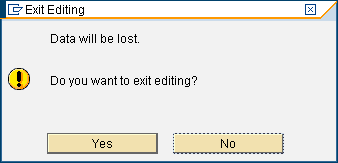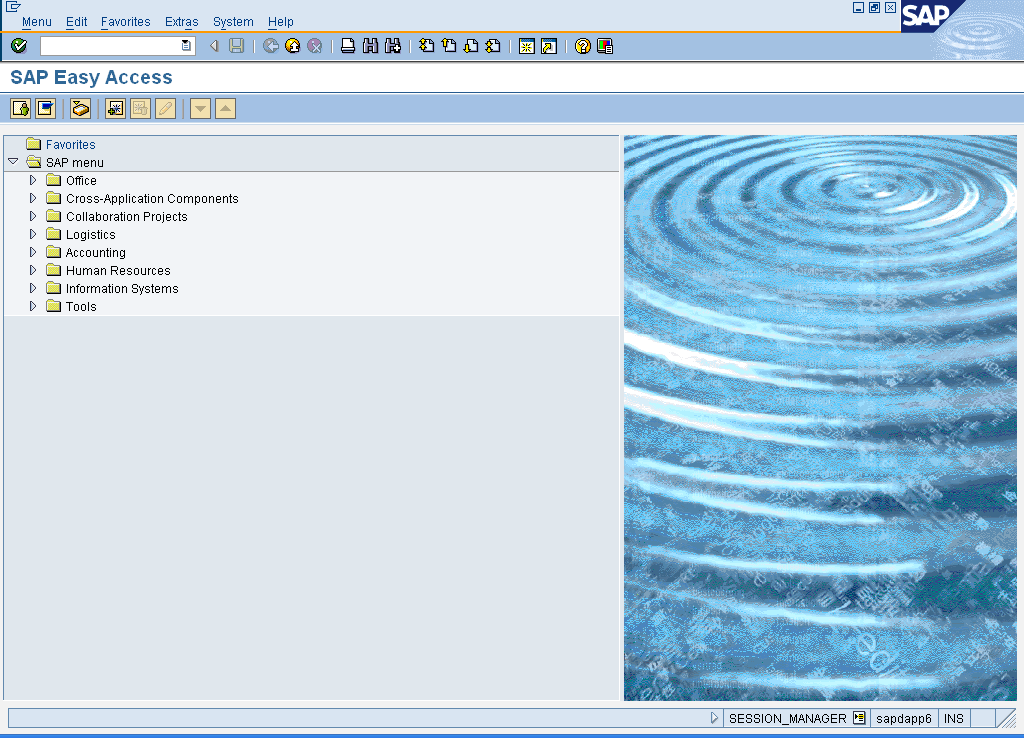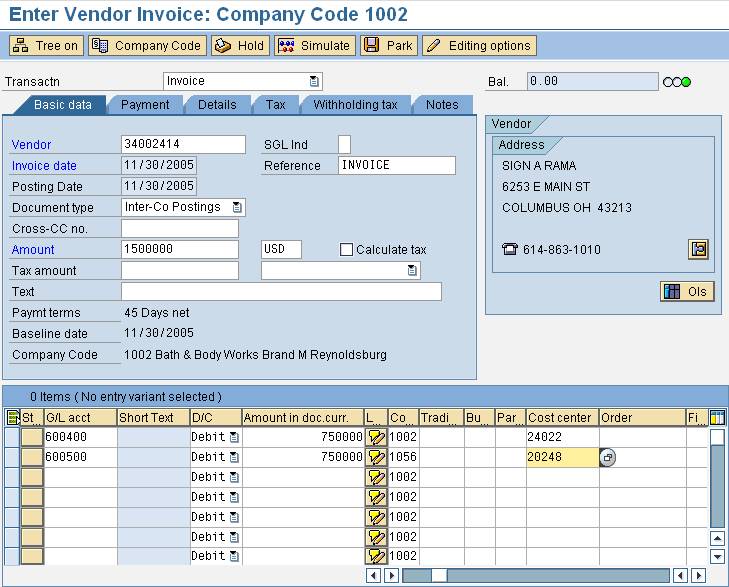Enter Incoming Invoices - FB60 (FB60)
Purpose
Use this transaction to enter incoming invoices into SAP.
When To Do This
Perform this procedure when manually entering invoices
into SAP.
Prerequisites
·
A vendor master record must exist in the system.
·
The invoice must be approved and coded prior to posting.
Menu Path
Use the following menu path to begin this transaction:
·
Select Invoice to go
to the Enter Vendor Invoice: Company Code XXXX screen.
Transaction Code
Helpful Hints
·
R/O/C: "R" = Required, "O" = Optional, "C" =
Conditional.
·
Enter all invoices for the same company code at the same time so
that the header detail does not need to be changed at each invoice entry.
Procedure
1. Please
refer to the "Internal Controls Procedures" for manual procedures that are
critical to ensuring an effective control environment for this activity.
2. Start the transaction using the menu path or transaction code.
3. Perform one of the following:
|
To
|
Then
|
Go To
|
|
If changing the existing company code
|
Click  go
to the Enter Company Code window go
to the Enter Company Code window
|
Step 4
|
|
Enter invoice for 1 company code
|
|
Step 6
|
|
Change screen setting to allow inter-company postings
|
|
Step 19
|
|
Enter invoice for inter-company postings
|
|
Step 26
|
Enter
Company Code
4. As required, complete/review the following field:
|
Field Name
|
R/O/C
|
Description
|
|
Company code
|
R
|
Independent accounting
unit; in most cases is a legal entity. You can prepare a balance sheet and
income statement for each company code. Several company codes can be set up
to manage the accounts of independent companies simultaneously.
Example: 1051
|
5. Click  to continue to the Enter
Vendor Invoice: Company Code XXXX screen.
to continue to the Enter
Vendor Invoice: Company Code XXXX screen.
6. Click the  tab to go to the Enter
Vendor Invoice: Company Code XXXX (Basic data) screen.
tab to go to the Enter
Vendor Invoice: Company Code XXXX (Basic data) screen.
Enter
Vendor Invoice: Company Code XXXX (Basic data)
 If necessary, click
If necessary, click  or
or  to scroll right or left to display the full screen.
to scroll right or left to display the full screen.
7. As required, complete the following fields:
|
Field Name
|
R/O/C
|
Description
|
|
Vendor
|
R
|
Business partner that
provides materials or services.
Example: Office
Depot
|
|
Invoice date
|
R
|
The date appearing on
the invoice.
Example: 03/15/2005
|
|
Reference
|
R
|
Allows for further
clarification of an entry by referencing to other sources of information,
either internal or external to SAP. Any SAP-posted document number can be
used as a "reference" when entering a new document.
Example: 54321
|
|
Amount
|
R
|
Total number, quantity
or value.
Example: 1350.00
|
|
G/L acct
|
R
|
Accounting ledger
created to support the creation of statutory reports.
Example: 611880
|
|
Amount in doc.curr.
|
R
|
Value in the current
location currency.
Example: 1350.00
|
|
Cost Center
|
R
|
An organizational unit
within a controlling area that represents a defined location of cost
incurrence.
Example: 21094
|
8. Click  to validate the
entries.
to validate the
entries.
 The system displays the message "G/L
account XXXX is relevant to tax; check code". This message automatically
displays on all manually entered invoices but can be ignored if there is no tax
relevance to the invoice.
The system displays the message "G/L
account XXXX is relevant to tax; check code". This message automatically
displays on all manually entered invoices but can be ignored if there is no tax
relevance to the invoice.
9. Click  to validate the entry.
to validate the entry.
10. Click the  tab to go to the Enter
Vendor Invoice: Company Code XXXX (Payment) screen.
tab to go to the Enter
Vendor Invoice: Company Code XXXX (Payment) screen.
Enter
Vendor Invoice: Company Code XXXX (Payment)
 Payment dates can be edited at this prompt.
Payment dates can be edited at this prompt.
11. As required, complete/review the following field:
|
Field Name
|
R/O/C
|
Description
|
|
Pmnt block
|
O
|
Payment block. Indicator
that allows you to block an account or individual items for payment.
Example: Free
for payment
|
12. Click  to validate the entry.
to validate the entry.
 The system displays the message "G/L
account XXXX is relevant to tax; check code". This message automatically
displays on all manually entered invoices but can be ignored if there is no tax
relevance to the invoice.
The system displays the message "G/L
account XXXX is relevant to tax; check code". This message automatically
displays on all manually entered invoices but can be ignored if there is no tax
relevance to the invoice.
13. Click  to validate the entry.
to validate the entry.
14. Click the  tab to go to the Enter
Vendor Invoice: Company Code XXXX (Notes) screen.
tab to go to the Enter
Vendor Invoice: Company Code XXXX (Notes) screen.
Enter
Vendor Invoice: Company Code XXXX (Notes)
 Important notes concerning the invoice can
be entered at this prompt.
Important notes concerning the invoice can
be entered at this prompt.
15. Perform one of the following:
|
If
|
Then
|
|
The invoice total is $5,000 or less
|
Select
|
|
The invoice total is greater than $5,000
|
Select
|
 The system displays the message "G/L
account XXXX is relevant to tax; check code". This message automatically displays
on all manually entered invoices but can be ignored if there is no tax
relevance to the invoice.
The system displays the message "G/L
account XXXX is relevant to tax; check code". This message automatically displays
on all manually entered invoices but can be ignored if there is no tax
relevance to the invoice.
16. Click  to validate the entry and
to go to the Enter Bar Code window.
to validate the entry and
to go to the Enter Bar Code window.
Enter Bar
Code
17. As required, complete/review the following fields:
|
Field Name
|
R/O/C
|
Description
|
|
Bar Code
|
R
|
Unique document key
(document ID) assigned to stored document by the content server. Used to
link a scanned image to an SAP document.
Example: 170000180009190008
|
|
Document Type
|
R
|
Key that identifies to
which group of documents this document will be assigned. Documents of the
same type contain common information which is relevant to posting and update
of the value fields in the data base.
Example: AP
- Incoming invoice w/o verification
|
18. Click  to validate the entry.
to validate the entry.
 The system displays the message,
"Document XXXX has been parked/posted to company code YYYY."
The system displays the message,
"Document XXXX has been parked/posted to company code YYYY."
 You
have completed this transaction.
You
have completed this transaction.
19. Screen set-up to enter incoming vendor invoice
for multiple companies
20. Click  .
.
Accounting Editing Options
21. As required, complete/review the following field:
|
Field Name
|
R/O/C
|
Description
|
|
Doc.type option
|
R
|
The document type
determines where the document is stored as well as the account types to be
posted.
|
22. Click  .
.
23. Click  .
.
Enter Vendor Invoice: Company Code XXXX
24. Click  .
.
Exit Editing
25. Click  .
.
SAP Easy Access
26. Start the transaction using the menu path or transaction code.
 Document Type will now appear under Posting
Date.
Document Type will now appear under Posting
Date.
27. Change Document Type to Inter-Co Postings.
Enter Vendor Invoice: Company Code XXXX
28. As required, complete/review the following fields:
|
Field Name
|
R/O/C
|
Description
|
|
Vendor
|
R
|
Business partner that
provides materials or services.
|
|
Invoice date
|
R
|
The date appearing on
the invoice.
|
|
Posting Date
|
R
|
The date on which a
transaction in SAP will be posted to the appropriate accounts. SAP will
default this field to be the current date, but changes are allowed. For
items to be posted in a future or past period, you must enter the posting
date.
|
|
Document type
|
R
|
Key that identifies to
which group of documents this document will be assigned. Documents of the
same type contain common information which is relevant to posting and update
of the value fields in the data base.
|
|
Amount
|
R
|
Total number, quantity
or value.
|
|
Tax Amount
|
O
|
Governmental charges
applied to sales and services.
|
|
SAP Tax code
|
R
|
The tax code represents
a tax category which must be taken into consideration when making a tax
return to the tax authorities.
|
|
G/L acct
|
R
|
Accounting ledger
created to support the creation of statutory reports.
|
|
Amount in doc.curr.
|
R
|
Value in the current
location currency.
|
29. As required, complete/review the following fields:
|
Field Name
|
R/O/C
|
Description
|
|
Cost center
|
R
|
An organizational unit
within a controlling area that represents a defined location of cost
incurrence.
|
|
Company Code
|
R
|
Independent accounting
unit; in most cases is a legal entity. You can prepare a balance sheet and
income statement for each company code. Several company codes can be set up
to manage the accounts of independent companies simultaneously.
|
Enter Vendor Invoice: Company Code 1002
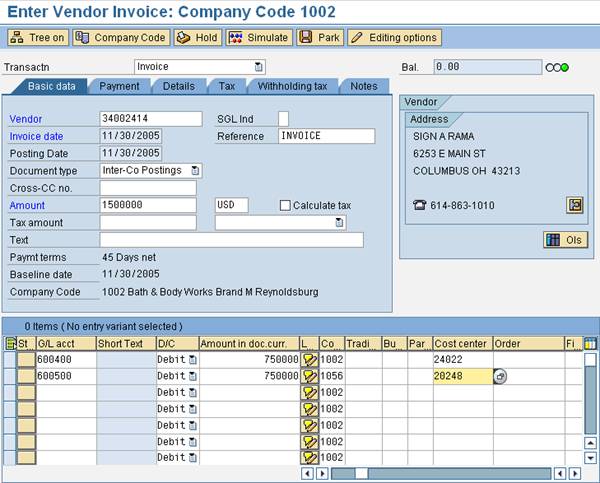
28. Perform one of the following:
|
If
|
Then
|
|
The invoice total is $5,000 or less
|
Select
|
|
The invoice total is greater than $5,000
|
Select
|
29. Click  to validate the entry and
to go to the Enter Bar Code window.
to validate the entry and
to go to the Enter Bar Code window.
Enter Bar Code
30. As required, complete/review the following fields:
|
Field Name
|
R/O/C
|
Description
|
|
Bar Code
|
R
|
Unique document key
(document ID) assigned to stored document by the content server. Used to
link a scanned image to an SAP document.
Example: 170000180009190008
|
|
Document Type
|
R
|
Key that identifies to
which group of documents this document will be assigned. Documents of the
same type contain common information which is relevant to posting and update
of the value fields in the data base.
Example: AP
- Incoming invoice w/o verification
|
31. Click  to validate the entry.
to validate the entry.
32. Click 
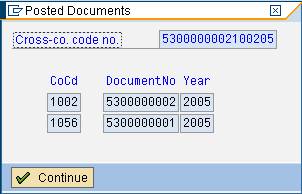
33. The activity is now complete.
Result
You have entered a non-PO incoming invoice into SAP.
Comments
None
![]() Financial Accounting
Financial Accounting ![]() Vendors
Vendors ![]() Document
Entry
Document
Entry ![]() Invoice to go
to the Enter Vendor Invoice: Company Code XXXX screen.
Invoice to go
to the Enter Vendor Invoice: Company Code XXXX screen.